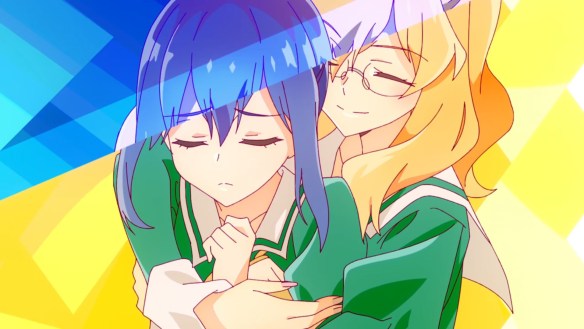Hello folks, and welcome back to Wrong Every Time. Today I am eager to return to Cafe Liebe, and see how things are faring for our hapless kohai Hime. After being conscripted into service as a replacement for her manager Mai, Hime swiftly managed to trip over or smash into basically every convention of their fictional girls’ academy. Though she has some vague understanding of the genre territory being explored, the lingo is still foreign to her; she has mastered a precise script of feigned modern-day courtliness, but her affectation bears only a passing resemblance to the assumed calls and responses of Liebe Girls’ Academy.
Of course, that precise formality of assumed language is exactly why Liebe’s customers find this performance so enticing. Hime is talented at improvising in the manner of a genuine social butterfly, but the genre-born assumptions of Liebe flatter a very different audience, comforting those who, like Kanoko, find the vagaries of spontaneous conversation foreign and intimidating. Scripts provided by fiction allow those who have difficulty expressing themselves organically to connect with others; when the rules are so clearly defined, there is little fear of putting your foot in your mouth. And of course, it’s not like organic conversations don’t follow their own unspoken scripts, as Hime’s initial talents well demonstrate. All human interactions are in part a performance of selfhood, and through Cafe Liebe, Yuri is My Job! is consistently demonstrating the differences and nuances of performing for yourself, for the sake of being understood, and for the approval of an assumed audience. Let’s see how Hime fucks it up this time!
Episode 3
“What Should I Believe?” An excellent episode title for this show; these performances might facilitate a certain common understanding, but they also always introduce the question of what is just performance, and what is earnest sentiment. Softening language through genre ritual can make it easier to voice your feelings, but that’s partially because you’re blurring your intent rather than declaring it clearly
Interesting color design conceit throughout this OP, where their “backstage” lives are presented as shadowed and cold, less vibrant than their performances
Given that conceit, the OP seems to be implying that Sumika’s off-stage fondness for Kanoko will bleed into their performed relationship
We open with another standard day at Cafe Liebe, as Hime continues to struggle in writing down orders
Excellent squeaking noise from Hime as her failures are discovered by Mitsuki
“I taught you the shorthand for the menu already. When will you learn!?” Outside of the dramatically heightened confines of the cafe itself, Mitsuki’s condemnations parse entirely as scorn, not the sort of “oh you” love language of Liebe Girls’ Academy. Language is relative, contextual
Of course, “antagonism as affection” is a trope with a long history across many mediums and genres, and the assumption of that standard frequently excuses old-fashioned bullying. Ceding our perspectives on human interaction to media cliches can easily have a deleterious effect on our real-world relationships
Back at school, Hime gracefully turns down another offer to join a school club, ending on a flattering “thanks for considering me” that ensures her rejection actually earns her more points
“This! This is how it should be for me!” Hime basks in her mastery of high school’s performance expectations. Given her confidence here and lack of fluency with Liebe’s script, I imagine she’ll eventually fall somewhere in the middle, coming to actively seek sincere common understanding with others, rather than this worshipful distance
“What’s her problem, anyway?” Hime obviously doesn’t actually care at this point, but I’m curious myself as to why Mitsuki has come to value these performances so highly. Presumably mastering this script was her response to being socially rejected, just as Hime chose to master the script of modern high school stardom. We all want to be loved, and we will embrace the standards of whatever community offers that love
Modern fan culture has taken that natural instinct in a frustratingly tribalistic direction, frequently conditioning adherents to no longer possess a common understanding with non-fans, and thus fostering an “us versus them” dynamic that you see in things like the urge to “gatekeep” videogames or anime. It’s essentially the same way religions will intentionally provoke violent responses from outsiders through alleged outreach efforts, thus ensuring those within the tribe see all outsiders as enemies
Hime has figured out a way to manage orders: explicitly request customers speak slowly, turning her ineptitude into part of the performance. Very clever
But she’s still making this too much about the audience worshiping her specifically, rather than believing in their collective performance. Too much ego in her affectation, and too much awareness of the customer’s eye; this is partially a fantasy of intrusion into a private world, which demands a sort of obliviousness to your own performance
As the others attempt to steer the conversation elsewhere, Hime continues to declare her bird rights philosophy
“You’re being quite needy today.” Mitsuki eventually takes the bait and gives her a hug
“I just want to be on good terms with you, Onee-sama.” “No need to worry. Your Onee-sama’s just being shy.” Sumika gestures towards one of the tricky contradictions with Mitsuki: her performance isn’t all feigned, as she actually has trouble expressing her feelings in real life too
Sumika points out that Hime didn’t actually mess up in her performance, but Mitsuki still has difficulty praising her
“Oh, Kanoko. I didn’t see you there.” Even her best friend often overlooks her. A person with basically no presence
Kanoko wonders why Hime is working so hard to gain the approval of just one girl who clearly doesn’t like her
“Bad people shatter my facade.” Hime reflects on her true feelings being revealed back in middle school. The “bad people” are the ones she has to work hardest to win over, lest they destroy her performance entirely. Her past rejection has informed this desperate people-pleasing complex
“Once people find out I’m acting, everyone flips out and leaves. That’s why I can’t let anyone know it’s a facade. Bad people out me and get in my way. That’s why I have to be liked by bad people, too. I have to be loved by everyone.” Any partial illusion will inevitably be deflated by those who don’t believe her. Because she cannot seem to find satisfaction in individual bonds, she must ensure her illusion is total. Ironically, her demand for total worship emphasizes her underlying lack of faith in her own merits as a person
Also seems like Mitsuki herself was the one who punctured her bubble back in middle school. So that explains her natural distrust of Hime
And yet, she actually cares about Kanoko’s genuine opinion of her, and thus heads back to inform Kanoko that this whole performance with Mitsuki is an act. Of course, it’s Mitsuki in the dressing room, not Kanoko. Ironic that her first sincere expression this episode only further affirms Mitsuki’s distrust of her
The next day at work, Kanoko pledges to protect her if Mitsuki retaliates. The thing is, Mitsuki’s position isn’t really more reasonable than Kanoko’s – we all put on performances in our daily life, because a performance of cheer and harmony is one of the easiest, most fundamental ways we get along smoothly in society. Mitsuki’s scorn for social performance is itself a pretty adolescent attitude, akin to the initial perspectives of Oregairu’s leads
At work, Mitsuki proudly explains the nature of Earl Grey tea to the customers. I assume to her, fluency in this imagined world’s expectations is actually freeing, as the rules here have a clear internal consistency. In contrast, the real world is full of people like Hime, who lie and make their own rules rather than expressing themselves clearly. Those who lack natural social faculties will often gravitate towards the clear expectations of genre like this
“It’s almost annoying how perfect you are.” In contrast, Sumika seems to possess full confidence both on and off stage, meaning she can actually embellish on the script rather than just read her prescribed lines
“Come on, turn on the ‘little sister’ already.” Mitsuki already knew who Hime was, so she has no interest in calling her out further. She just wants her to get back to supporting the pageantry
But Hime’s usual vector for conversation is her facade, and she now feels too nervous to wield that against Mitsuki, knowing that Mitsuki knows it’s a fake. They have lost any common language
Poor Hime. She thought her performance was so effective, but both her senpais know it’s a false front, and now she’s too nervous about being discovered to be her usual, flagrantly dishonest self
“What? What is this!? What are they doing!?” Hime now finds herself in the position she feared the most – utterly outside of the group dynamic, hearing whispers in the distance and wondering what they’re saying about her
Mitsuki and Hime reach their first point of genuine understanding backstage, through Hime realizing that Mitsuki is as confused by her behavior as she is confused by Mitsuki’s. Neither of them are certain how the revelation of Hime’s performance is supposed to change how they feel about each other
And so Hime at last lets her shields down a little, admitting her fears about being shunned, and her genuine desire to be liked by Mitsuki
Unfortunately, this confession is accompanied by a brief riff on the “horrible person” who once revealed her secret. Whoops
And Done
Oof, yeah, that’s a tough one. And she was working so hard not to step on any live wires, too! It feels very in keeping with this production’s love of social ironies that Hime’s first attempt to actually confess her honest feelings would backfire so spectacularly, essentially proving to her that opening up to others is the surest way to make them reject her. Both of them were inches away from some genuinely healthy social growth, but the trauma of past experiences certainly has a way of punishing us for attempting to move beyond them. But unfortunate foot-in-mouth moments aside, it’s still encouraging to see Hime attempting more sincerity, and also coming to some understanding of the distinctions between her school and cafe performance’s assumed audiences. Now I just want to learn more about Mitsuki’s deal!
This article was made possible by reader support. Thank you all for all that you do.




